

Policy network. Un article de Wikipédia, l'encyclopédie libre.
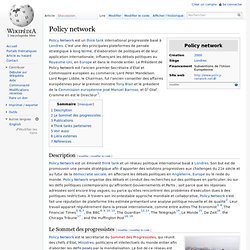
Policy Network est un think tank international progressiste basé à Londres. C’est une des principales plateformes de pensée stratégique à long terme, d’élaboration de politiques et de leur application internationale; influençant les débats politiques au Royaume-Uni, en Europe et dans le monde entier. Le Président de Policy Network est l’ancien premier Secrétaire d’État et Commissaire européen au commerce, Lord Peter Mandelson. Lord Roger Liddle, le Chairman, fut l’ancien conseiller des affaires européennes pour le premier ministre Tony Blair et le président de la Commission européenne José Manuel Barroso, et Dr Olaf Cramme en est le Directeur[1]. Description[modifier | modifier le code] Policy Network est un éminent think tank et un réseau politique international basé à Londres.
Hellfire Club. The first Hellfire Club was founded in London in 1718, by Philip, Duke of Wharton and a handful of other high society friends.[5] The most notorious club associated with the name was established in England by Sir Francis Dashwood,[6] and met irregularly from around 1749 to around 1760, and possibly up until 1766.[7] In its later years, the Hellfire was closely associated with Brooks's, established in 1764.
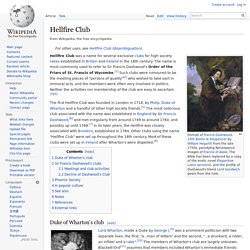
Other clubs using the name "Hellfire Club" were set up throughout the 18th century. Most of these clubs were set up in Ireland after Wharton's were dispelled.[8] Duke of Wharton's club[edit] According to at least one source, their activities included mock religious ceremonies and partaking in meals containing dishes like Holy Ghost Pie, Breast of Venus, and Devil's Loin, while drinking Hell-fire punch.[5][18] Members of the Club supposedly came to meetings dressed as characters from the Bible.[18] Sir Francis Dashwood's clubs[edit] Meetings and club activities[edit] Benjamin Franklin. Benjamin Franklin FRS (January 17, 1706 [O.S.
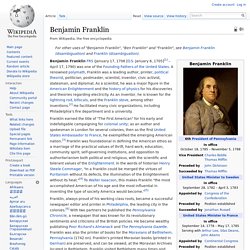
January 6, 1705][1] – April 17, 1790) was one of the Founding Fathers of the United States. A renowned polymath, Franklin was a leading author, printer, political theorist, politician, postmaster, scientist, inventor, civic activist, statesman, and diplomat. As a scientist, he was a major figure in the American Enlightenment and the history of physics for his discoveries and theories regarding electricity. As an inventor, he is known for the lightning rod, bifocals, and the Franklin stove, among other inventions.[2] He facilitated many civic organizations, including Philadelphia's fire department and a university.
Franklin, always proud of his working class roots, became a successful newspaper editor and printer in Philadelphia, the leading city in the colonies.[6] With two partners he published the Pennsylvania Chronicle, a newspaper that was known for its revolutionary sentiments and criticisms of the British policies. Early life in Boston. Time / 2003. Secrets of the Hellfire Club. Much of the knowledge that we have of the Monks of Medmenham Abbey derives from the scandals and political debates surrounding John Wilkes, who was a key proponent of political reform in the third quarter of the eighteenth century.
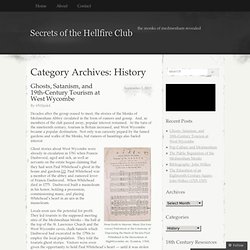
It is easy to overlook Wilkes’s education in a rush to explore the controversies of the 1760s and 1770s. However, the nature of Wilkes’s education provides insight into the intellectual milieu of the Hellfire Club. Wilkes was the son of an Anglican brewer, but his education seems to have been controlled by his Presbyterian mother. In 1734, she sent John and his two brothers to study with the Presbyterian schoolmaster John Worsley.[1] His father eventually had him study with Matthew Leeson, a Presbyterian minister, who abandoned his church at the age of 60 during a crisis of conscience that led him to embrace the Arian creed.[2] The Hellfire Club. Stratégies de lobbying. Suite à la crise financière de 2008, l’Union Européenne a mis en œuvre un important dispositif de réforme de son système de surveillance financière : un nouveau Système Européen de Surveillance Financière (SESF) sur la base des recommandations du Rapport Larosière et de son « groupe de haut niveau ».
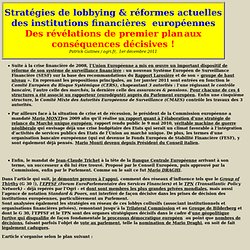
En reprenant les propositions principales, au 1er janvier 2011 sont entrées en fonction le Comité Européen du Risque Systémique (CERS), chapeautant 3 autorités : l’une régissant le contrôle bancaire, l’autre celle des marchés, la dernière celle des assurances & pensions. Pour chacune de ces 4 structures a été associé un rapporteur (eurodéputé) auprès du Parlement européen. Enfin une cinquième structure, le Comité Mixte des Autorités Européenne de Surveillance (CMAES) contrôle les travaux des 3 autorités. Round table (think tank) Un article de Wikipédia, l'encyclopédie libre.
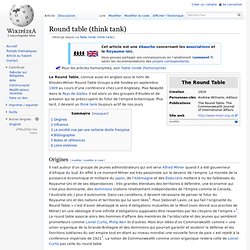
Le Round Table, connue aussi en anglais sous le nom de Rhodes-Milner Round Table Groups a été fondée en septembre 1909 au cours d'une conférence chez Lord Anglesey, Plas Newydd dans le Pays de Galles. Il est alors un des groupes d'études et de pression qui se préoccupent du futur de l'empire britannique. Plus tard, il devient un think tank toujours actif de nos jours Il nait autour d'un groupe de jeunes administrateurs qui ont servi Alfred Milner quand il a été gouverneur d'Afrique du Sud.